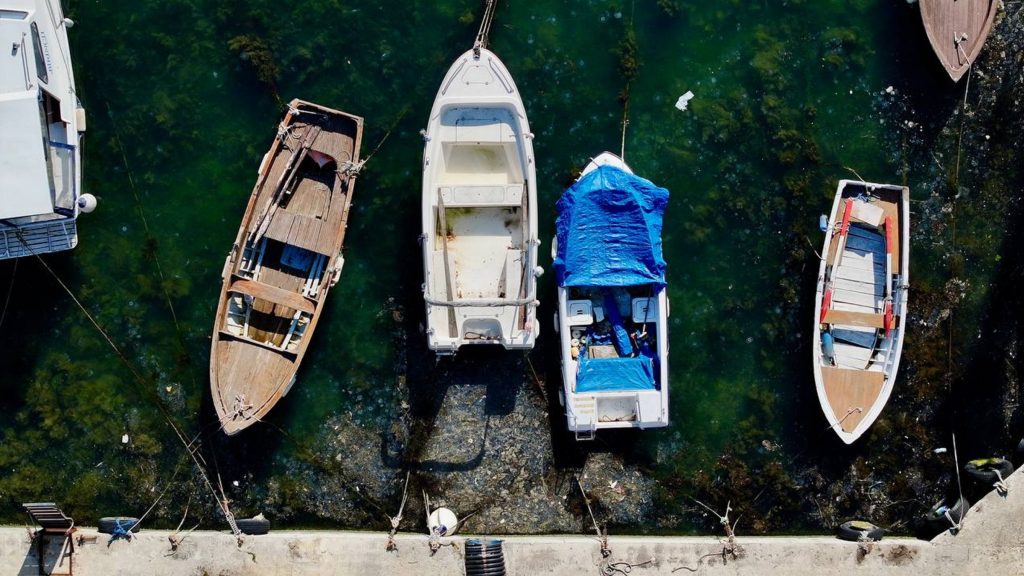A layer of mucilage, colloquially known as “sea snot,” was spotted on the surface of the water along Istanbul’s Beykoz coastline.
Experts are pointing out that the rising temperatures have brought the risk of mucilage back to the forefront in the Marmara.
Environmental engineer Mustafa Öztürk, who stated that mucilage is an indicator of pollution in seas, said: “Since yesterday, as the temperatures have risen, biochemical reactions increase in the already polluted seawater and jellyfish drift in. These factors lead to the rise of mucilage. Mucilage is a sign of pollution. The sea cries out, ‘I am getting polluted, clean me.'”
Mucilage was particularly an issue in 2021 in the Marmara. During that period, mucilage layers covering the sea’s surface were especially an issue in May and June. Recently, the reappearance in Beykoz has raised concerns about whether the same widespread problems will be experienced again this year.
Öztürk, who noted that temperatures in the Marmara region have started to rise, said: “Previously, it was forming at the bottom of the sea; now, we might see this pollution frequently on the surface of the sea. All municipalities in the Marmara basin will treat their wastewater at advanced levels. One of the most important of these is the wastewater of the Istanbul Metropolitan Municipality.”
Öztürk pointed out the decreasing oxygen levels in the Marmara, stating: “In areas where mucilage forms, the transfer of oxygen from the air to the marine environment is prevented. The Sea of Marmara gradually begins to lose oxygen. The normally oxygen-rich water from the Black Sea starts to come to the Marmara with less oxygen.”
He added: “This situation is very dangerous. In areas where mucilage forms, especially because it covers the surface, marine environments transform from carbon sinks into carbon emission areas. This situation is dangerous for our seas, especially for Istanbul and the Marmara.”
Öztürk expressed that mucilage negatively affects fishing, stating: “For fishermen, fishing nets become covered with mucilage, like mud. Cleaning these nets and restoring them to their previous state is very costly, difficult and troublesome. For this reason, fishermen have taken an early vacation this year due to mucilage.”
He also emphasized that one of the main reasons for pollution is wastewater. “Domestic and industrial wastewater is discharged into the Marmara and the Bosporus without advanced treatment, carrying high pollution loads of nitrogen and phosphorus,” he said.
“In the coming period, it was previously forming at the bottom of the sea; now, we might see this pollution frequently on the surface,” he explained.
Addressing the effect of temperature, he also said: “The parameter that affects all of this is temperature. If the air temperature is above normal, and the sea water temperature is also above normal, mucilage will continue to form. Especially in areas where mucilage forms, it is necessary to measure pollutants such as pH and dissolved oxygen in addition to temperature. It is difficult to predict a result just by seeing mucilage or jellyfish.”
“All municipalities in the Marmara basin must treat their wastewater thoroughly. One of the most important of these is the wastewater of the Istanbul Metropolitan Municipality. Currently, preliminary treatment is being done, followed by deep-sea discharge. Instead, municipalities in the Marmara basin, including the metropolitan municipalities, need to urgently start the necessary investments and projects to treat wastewater at advanced levels.
“The first important step is this, the second is industrial wastewater. These industrial wastewaters also need to be treated at advanced levels. Nitrogen and phosphorus pollution must definitely be eliminated. Thirdly, one of the pollutants threatening the Marmara is agricultural pollution, which we refer to as diffuse sources. Due to this pollution, the Marmara is polluted by 80% from diffuse sources. Unless good farming practices and good livestock practices are implemented, the Marmara will not be free from mucilage,” he explained
Angler Metin Molla stated: “Tourism, I have a fishing boat and I was going on tours with it, but I haven’t been able to go out for months. The sea is full of mucilage, it’s full of mud. The nets are covered in mud; the fishing lines are covered in mud. This is not looking good. Mucilage from the gulf has come here and is flowing back. All the mucilage flowing from below is coming back up. It’s like cleaning up the waste in a toilet and treating it. We could also treat this with machines. Logically, you can think about it. If you’re treating that waste, you could also treat this with machines. Last year, they treated it in the Izmit area, but now they’re not.”
Fisherman Ibrahim Ethem Kis said: “We fish in Anadolu Kavağı and Rumelikavağı. There is no mucilage there. The wind blew from above and below, lifting all the waste. The water became muddy, and when there’s a southern wind, the sea ends up like this.”


